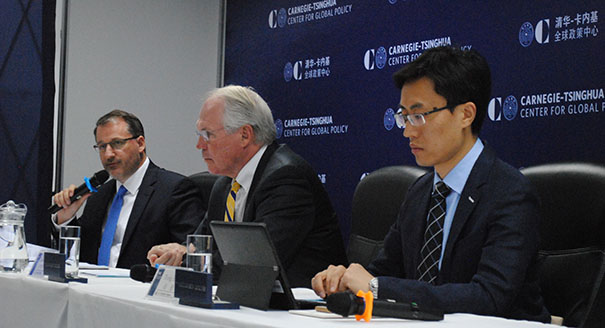Registration
You will receive an email confirming your registration.
Since President Trump accepted an invitation to meet with North Korean leader Kim Jong-un, he has raised expectations that North Korea might finally be willing to abandon its nuclear arsenal. Yet, as recent North Korean statements have demonstrated, and as most experts on the country have long argued, the U.S. and North Korea have very different definitions of denuclearization. If Trump and Kim do sit down for negotiations in Singapore on June 12, much uncertainty remains over whether the two sides will be able to make a deal.
Carnegie–Tsinghua director Paul Haenle moderated a discussion with Ambassador Christopher Hill, who served as chief U.S. negotiator with North Korea from 2005 until 2009 and also as ambassador to South Korea, and Tong Zhao, fellow at the Carnegie–Tsinghua Center, on what to expect at the Trump-Kim summit. The conversation included analysis of North Korea's intentions, the risks and benefits of signing a peace treaty to formally end the Korean War, divisions within China over North Korea policy, and U.S. redlines and definitions of success.
This event was in English and off the record.
DISCUSSION HIGHLIGHTS
- North Korea’s Intentions and Long-Term Objectives: A discussant said that North Korea’s deep paranoia is the fundamental reason it has developed its nuclear program. Now that Kim Jong Un has achieved his security objective by building credible nuclear deterrent, he has begun working on achieving economic development, a goal that requires maintaining good relationships with both China and the U.S. However, another discussant strongly disagreed that paranoia is a factor in North Korea’s development of nuclear weapons, and said that its nuclear program is not simply a deterrent but part of longer-term strategy to decouple the U.S. from the region.
- China’s Concerns and Interests: One discussant noted that the Chinese leadership shares common interests with both the U.S. and North Korea. While China continues to maintain concerns regarding the U.S. regional alliance network, particularly as the U.S.-China strategic rivalry continues to grow, the panelist said that China desires a denuclearized North Korea for reasons pertaining to both security and economic development. The panelist said that China believes the least costly option to achieve this goal is to assist North Korea in a strategic transition from isolated pariah state to normal international actor, making Chinese cooperation on the further use of sanctions an unlikely proposition.
- The Need for a Strong U.S.-China Relationship: A discussant said that the U.S. and China are each other’s most important international partner, and that the efforts of both parties are needed to resolve the current crisis. The panelist noted that this was a key acknowledgement within the Six-Party Talks, and one that is now missing in today’s bilateral diplomatic approach. The panelist said that previous patterns of cooperation are rapidly dissipating as the two countries continue to mismanage their relationship and increase tensions. The discussant argued that a much greater investment is needed from both countries in order to overcome roadblocks and work together on the North Korean issue.
- Likely Outcomes of the Singapore Summit: Both panelists expressed skepticism that the summit will produce substantive progress on denuclearization efforts. One discussant said a political announcement may be made regarding broad shared principles or areas of agreement, but that concrete steps toward a full dismantlement deal are highly improbable. The panelist noted that neither country is likely willing to make the radical concessions necessary for such an agreement. Another discussant added that the Trump administration and North Korean government may mutually denounce biological or chemical weapons within a broad, vague commitment to denuclearization as a means of contrasting the current negotiations with previous efforts.
Paul Haenle
Paul Haenle is the director of the Carnegie–Tsinghua Center for Global Policy based at Tsinghua University in Beijing. Haenle’s research focuses on Chinese foreign policy and U.S.-China relations.
Christopher Hill
Christopher Hill is a nonresident senior fellow at the Carnegie Endowment for International Peace. He served as U.S. ambassador to South Korea from 2004 to 2005 and assistant secretary of state for East Asian and Pacific Affairs from 2005 until 2009.
Tong Zhao
Tong Zhao is a fellow in the nuclear policy program at the Carnegie–Tsinghua Center for Global Policy.
